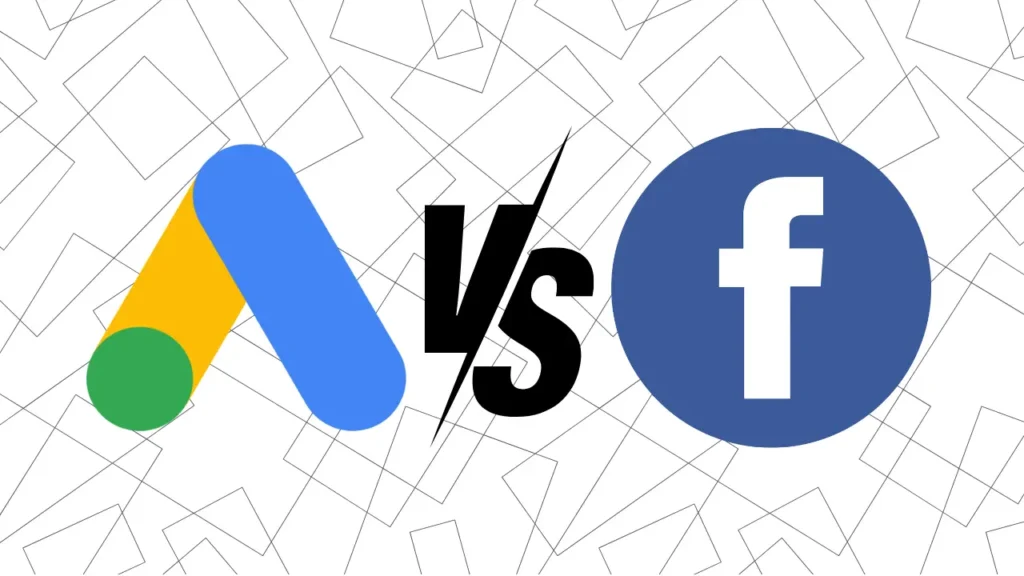Table of Contents
Let’s face it—digital advertising today is a bit like choosing between coffee and tea. They both work, they both give you energy, but the effect—and the flavor—is completely different.
That’s exactly how it feels when you’re deciding between Facebook Ads vs Google Ads.
They’re both powerful in their own ways. But which one is better for you? Your brand, your goals, and your budget?
That’s what we’re going to unpack together in this blog. No jargon. No fluff. Just a clear, friendly breakdown of what each platform does best, how they compare, and when you should use one (or both!).
First Up: What’s the Difference Between Facebook Ads and Google Ads?
Okay, let’s simplify this.
- Google Ads put your brand in front of people who are already searching for exactly what you offer. Think of it like tapping someone on the shoulder when they’re already in the store.
- Facebook Ads are about sparking interest—even if someone wasn’t looking for you yet. Imagine putting up a bright, eye-catching billboard on a street you know your audience walks every day.
In short:
- Google = intent
- Facebook = interest
Both work. But differently.
What Are Facebook Ads, Exactly?
Facebook Ads are part of Meta’s advertising platform—which also covers Instagram, Messenger, and more.
You can show your ads to people based on their age, location, interests, hobbies, behavior, even big life moments like moving or getting married. It’s like digital matchmaking for your brand.
And the ads? Super visual. Videos, photos, carousels, reels—you name it.
It’s perfect if you’re trying to get noticed, build your brand, or just remind someone, “Hey, you looked at this product yesterday!”
And What About Google Ads?
Google Ads are those sponsored search results you see when you Google something like “best skincare for oily skin” or “buy running shoes online.”
You’re basically bidding on keywords that your potential customer is typing into Google.
But wait—Google Ads also go beyond search. You can run:
- Display ads (those banners on websites)
- YouTube video ads
- Shopping ads (great for eCommerce)
- App promotion ads
It’s ideal if someone already knows they want something—you just want to make sure you’re the one they choose.
Facebook Ads vs Google Ads: Let’s Compare
Here’s where it gets interesting. Let’s break down how Facebook Ads vs Google Ads stack up in real life.
1. Intent vs Discovery
- Google Ads show up when buyers are ready to take action. They’re actively searching.
- Facebook Ads help you find people who might be interested—even if they weren’t looking.
👉 Use Google when someone already knows what they want.
👉 Use Facebook when you want to inspire them to want it.
2. Targeting Abilities
- Facebook is ridiculously good at targeting people based on their behavior and interests.
- Google is best at targeting based on what they’re searching for.
Let’s say you’re selling yoga mats.
- On Facebook, you could target women aged 25–40 who follow wellness pages and recently joined a fitness group.
- On Google, you’d show up when someone types “best non-slip yoga mat.”
Both are useful—but in different parts of the buying journey.
3. Ad Formats
- Facebook Ads = eye candy. Great for videos, images, carousels, stories, and reels.
- Google Search Ads = mostly text.
- Google Display & YouTube Ads = more visual, but less personal unless you set it up well.
If your product looks good (like clothing, food, or fitness gear), Facebook and Instagram are your best friends.
4. Cost and ROI
Let’s talk money.
- Google Ads often cost more per click because you’re paying for high intent. But that also means faster conversions.
- Facebook Ads usually cost less per click. But the buyer’s journey might take longer. You’ll probably need to retarget and warm them up.
Bottom line: Facebook is amazing for awareness and nurturing. Google is your go-to for conversions.
5. Analytics & Tracking
Both platforms offer solid tracking tools—Google has Google Analytics, Facebook has Meta Pixel.
But heads up: With recent privacy updates (like Apple’s iOS changes), Facebook tracking isn’t as crystal clear as it used to be.
So if having detailed data really matters to you, Google might just win by a hair.
When Should You Use Facebook Ads?
Go with Facebook Ads if you:
- Want to build brand awareness
- Have a product or service that looks great
- Know your ideal audience’s interests
- Want to run video or carousel ads
- Are okay with warming people up before they buy
💡 Example: You’re launching a new skincare line and want to build hype with tutorials, testimonials, and user-generated content.
When Are Google Ads Better?
Choose Google Ads if you:
- Want fast, direct conversions
- Sell products people already search for
- Operate locally (like a dentist or real estate agent)
- Have a solid keyword strategy
- Need to track ROI closely
💡 Example: You sell phone repair services. People Google that when their screen cracks—not while scrolling Instagram.
Can You Use Both?
Short answer: Yes. And you probably should.
Smart marketers don’t stuck at facebook ads vs google ads. They use both platforms to build a full marketing funnel.
Here’s how that might look:
- Facebook Ads for storytelling and awareness
- Retarget those viewers later with Facebook or Google Display Ads
- Google Search Ads hit right when they’re ready to purchase.
You’re covering all your bases: people who are curious and people who are ready.
Facebook Ads vs Google Ads Recap
| Feature | Facebook Ads | Google Ads |
|---|---|---|
| Intent | Low (discovery-based) | High (search-based) |
| Targeting | Demographics, interests | Keywords, search behavior |
| Ad Types | Visual (video, carousel, etc.) | Text, video, shopping, display |
| Cost per Click | Usually lower | Usually higher |
| Conversion Speed | Slower (needs nurturing) | Faster (high intent) |
| Best for | Brand awareness, audience building | Sales, leads, local business |
So… What’s the Verdict?
There’s no one-size-fits-all for Facebook Ads vs Google Ads.
Ask yourself:
- Do you want to build awareness or drive instant sales?
- Do you have a visually appealing product?
- Do you know what your customers are searching for?
If you’re just starting out, test both with small budgets. Run a Facebook video ad. Set up a few Google search campaigns. See what clicks (literally).
Then double down on what works.
Because there isn’t any winner in facebook ads vs google ads—it’s the brand that knows how to use both wisely.

